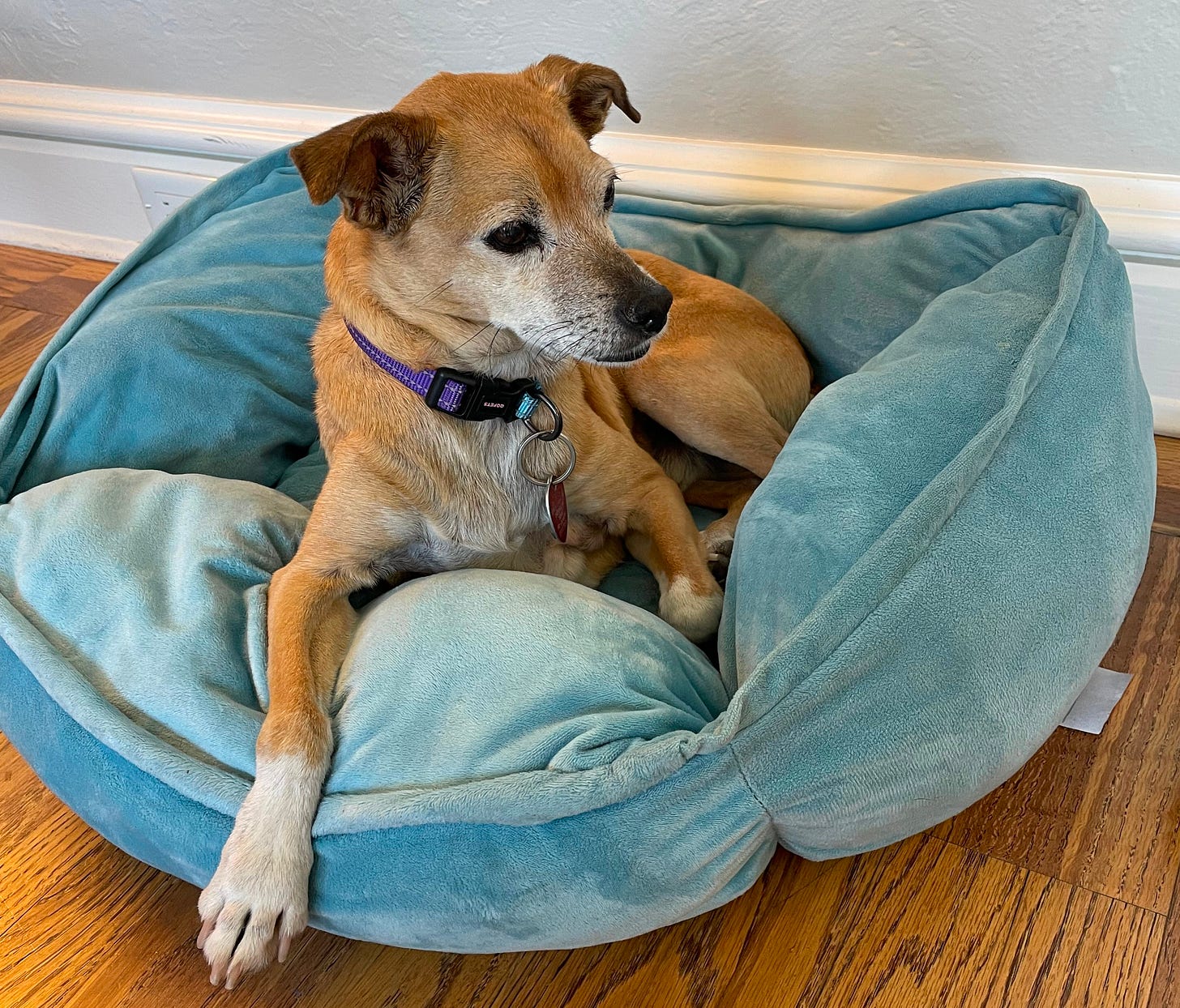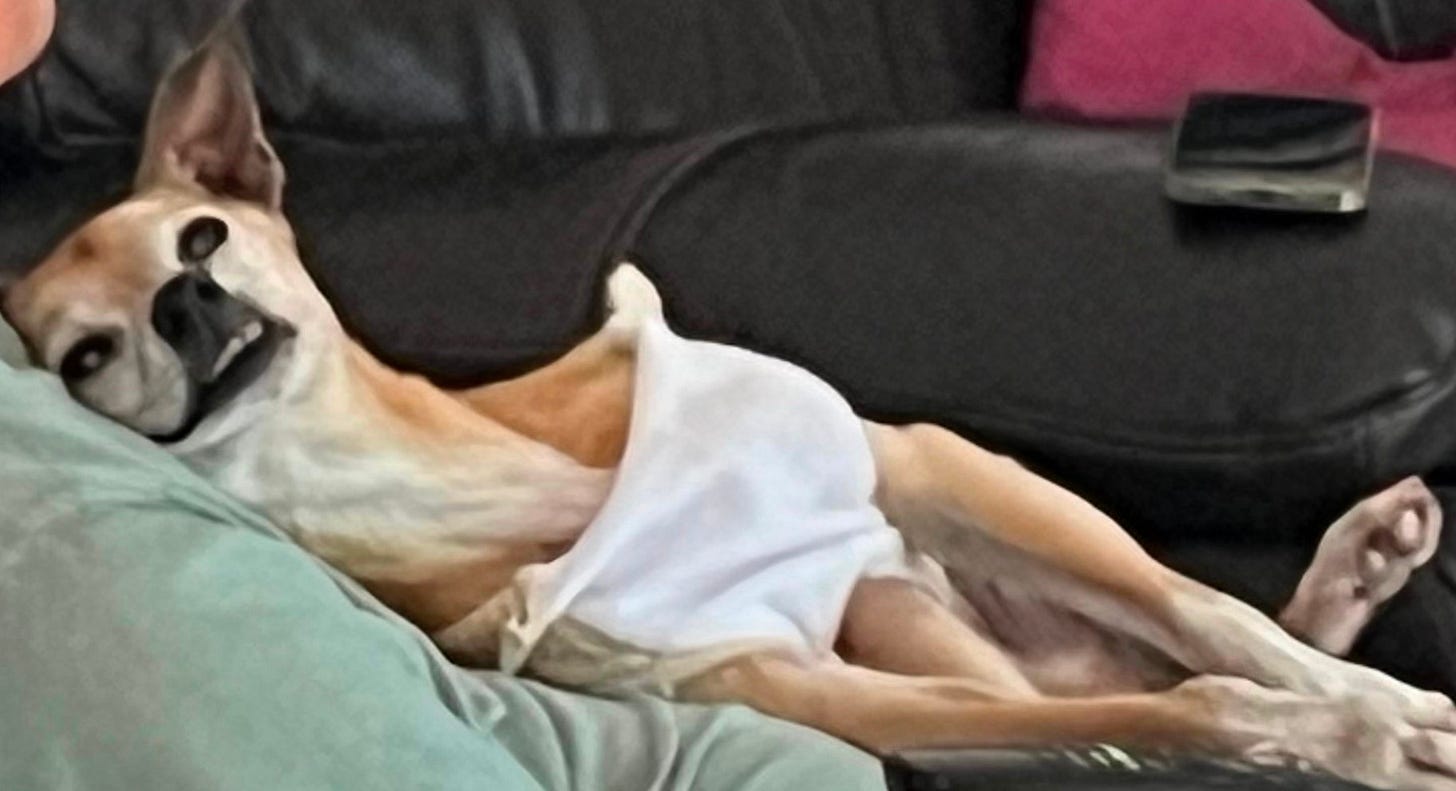Love, Loyalty, and Hourly Care
Taking Care of Fallon
I’ve talked about my grandpets several times over the years. That picture of Fallon was taken three years ago, when his Mom, Dad, sister Lily, and I were at the Empress Hotel in Victoria, British Columbia. Yes, the dogs are seasoned travelers.
When I first met Fallon, he fit into the palm of my hand. He sat on my lap, gave me kisses, and repeatedly showed me he cared. He is my sweet little buddy, even though I’ve been more of a cat person most of my life.
Fallon was a rescue dog and joined the family when he was a few months old, over 17 years ago. So, he’s an old man by dog standards, his hearing and sight are less sharp, he’s less active, and he probably has canine cognitive dysfunction (CCD) or dementia. However, he eats well, enjoys being outdoors, and loves the cat food and chicken snacks at my house—yes, cat food—his favorite. The vet says he’s doing as well as can be expected, given his age.
During a car trip last spring, I saw the enormous effort my daughter and son-in-law put into caring for him and the love they showed him in so many ways.
They brought his bed and blanket, prepared special food, and cleaned his messes. They slept on the floor beside him because he got confused in strange places. They got up with him two or three times during the night to take him outdoors to pee and held him close when he was anxious. It was clear - he wanted to be with them, and they wanted him there.
Experts say caregiver burden refers to the adverse effects of caring for a sick or dying family member, which includes older pets. They emphasize that, just as with caring for any family member, we must prioritize self-care and offer numerous suggestions to consider when taking on that role. So, there is a focus on
Recognizing and acknowledging their thoughts and feelings
Having a plan
Doing what they can
Finding joy in the present moment with him
They also offer numerous tips for providing care as pets grow older, such as
Changing their diet
Keeping them moving and active
Making the home senior pet-friendly
Being patient
Staying focused on their quality of life
Based on those tips, Fallon is well taken care of. They cook special meals for him, adjust the house and yard to accommodate his needs, and show infinite patience as they carefully monitor his quality of life.
Today, four months after that trip, he’s with us, but he’s lost ground. Even though caregiving duties have increased, they manage to keep up.
They get up every couple of hours to take him outside because he has little bladder or bowel control and can get lost or stuck in the backyard. He eats well but needs support to stand while eating. He doesn’t seem to be in pain, and although he’s skinny and weak, he gets around - especially when food is involved.
There are daily discussions of putting him to sleep, but he’s okay, and they’re willing to care for him a while longer. That difficult decision is looming, however.
The other day, my daughter and I took him for a walk in the stroller. He used to love it, but this time he was scared and uncomfortable, so the walk was short. When we got back to my apartment, he relaxed and fell asleep for over an hour. One minute, it seems like the time is now, but then again, maybe not.
Not an easy time for all involved right now.
I’d love it if you could share the Aging Well newsletter with others. I want to share lessons I’ve learned through years of life and caregiving with as many people as possible, and more than anything, I want to continue expanding our community of readers.
So, please forward this email to a friend and invite them to join us. They can subscribe here:
Thank you for being part of the Aging Well community.
Janice Walton is a psychologist, a widow, a mother, a grandmother, a great-grandmother, and a writer. She has written over 300 articles for Substack since January 2021.





A love story of another kind.
Thank you for this essay. I’m visiting my mother this week who is 94 and still living independently. She struggles, though. Her short-term memory is very poor, she gets confused easily, goes to bed earlier and earlier and gets up later and later, and is fatigued all the time. Moving her into assisted living would probably kill her.
We lost our 16 year old cat last year a month after my mother-in-law died; he gradually declined and then suddenly got worse. And our 18 year old cat died this January.
It’s hard watching our loved ones decline, wondering if they’ll still be here in the morning. It’s difficult for me to stay patient with my mother when she asks me for the tenth time in almost as many minutes what day it is. I try to find joy in the absurd. I try to accept that I’m grieving her eventual death.